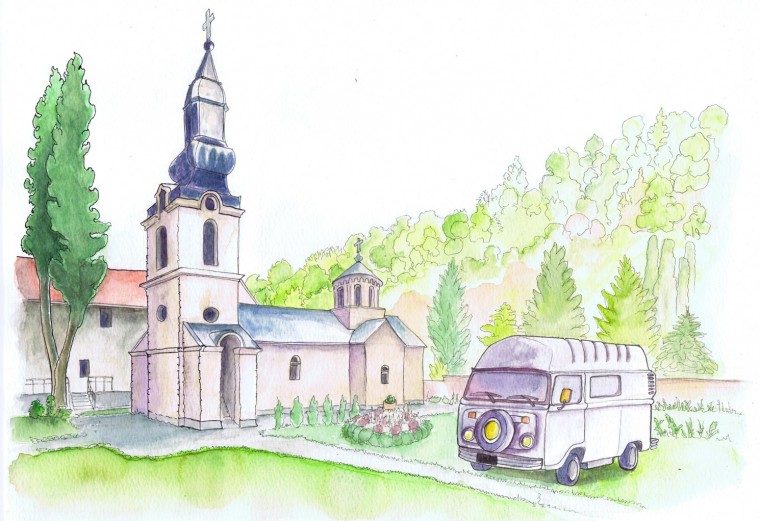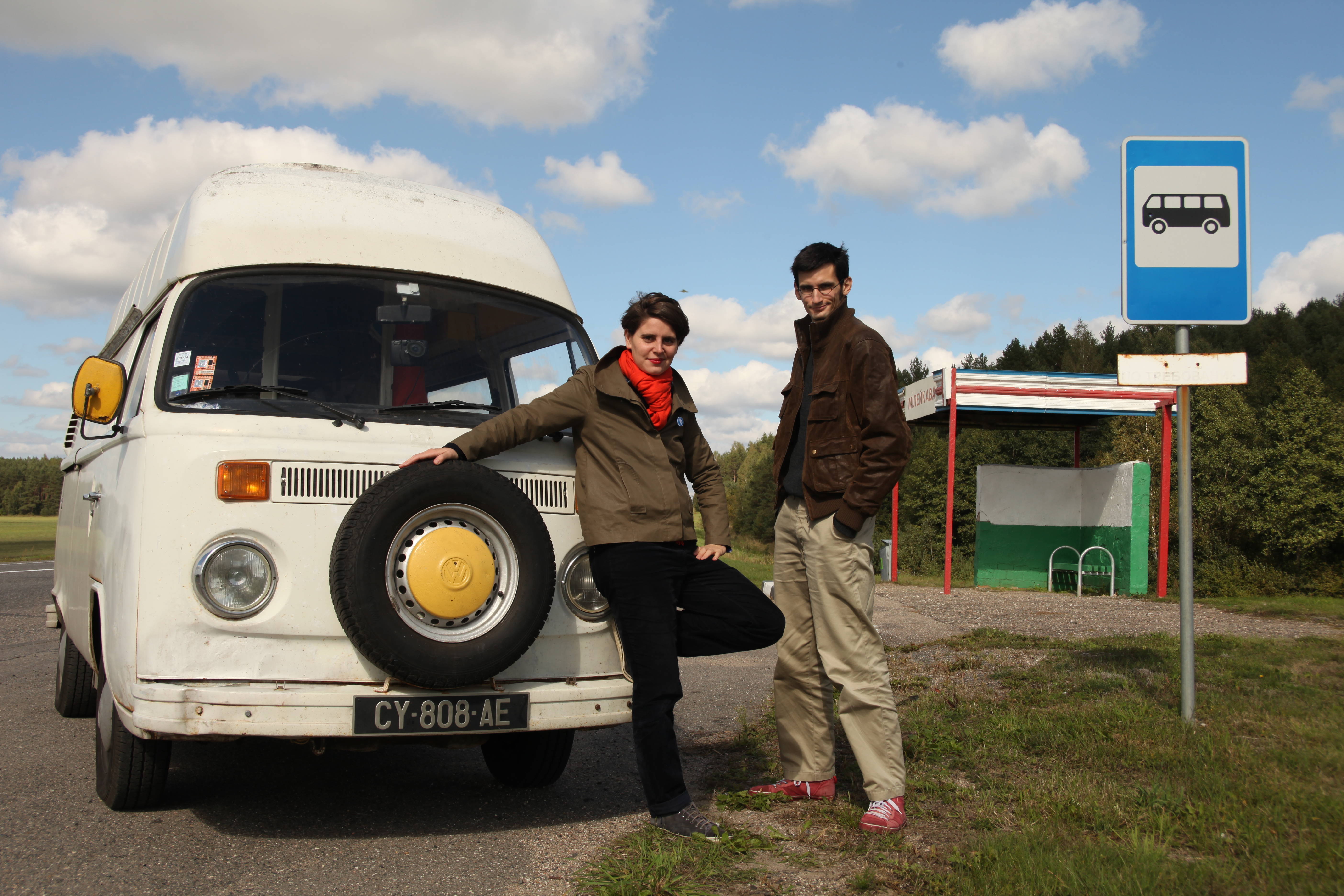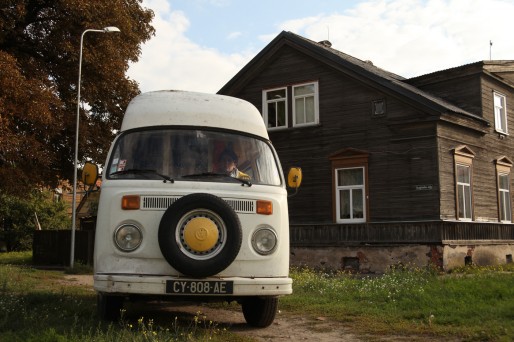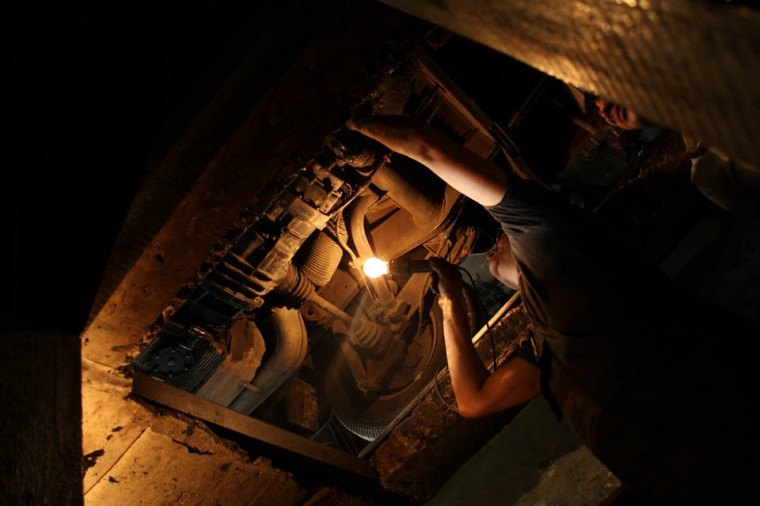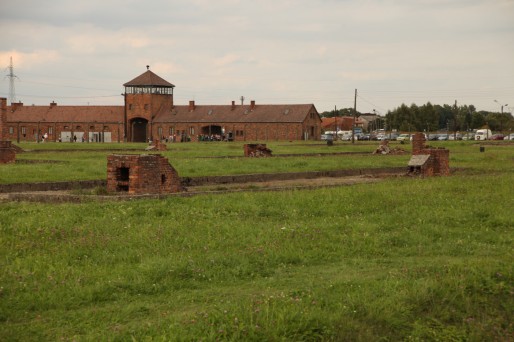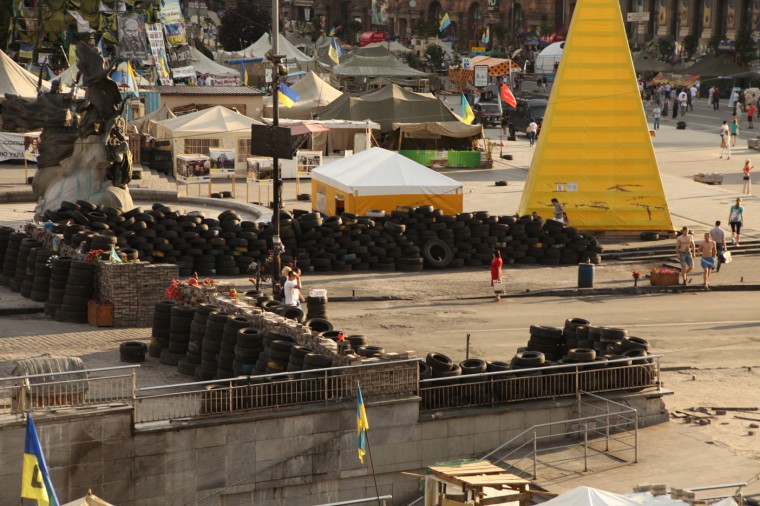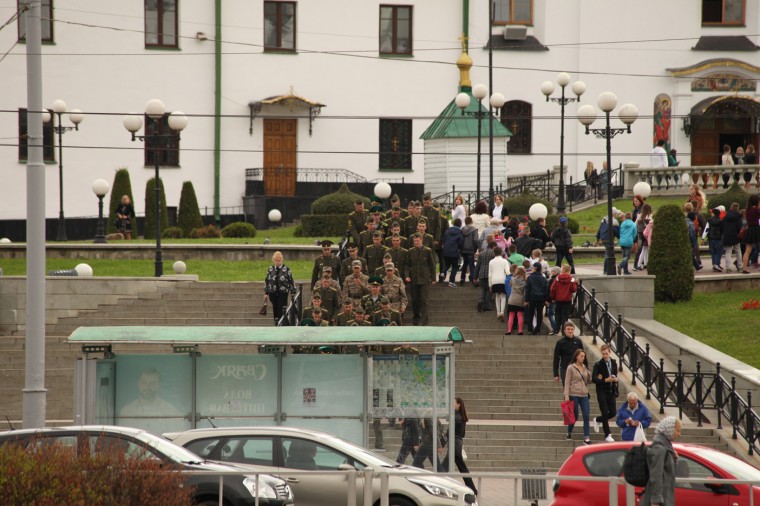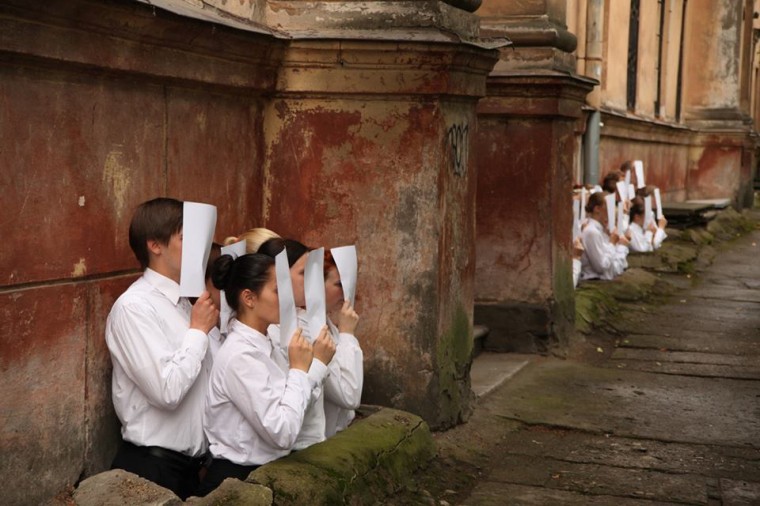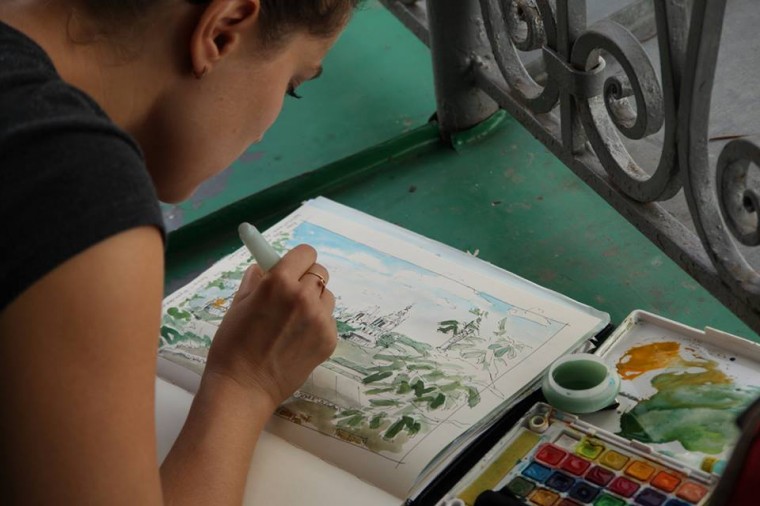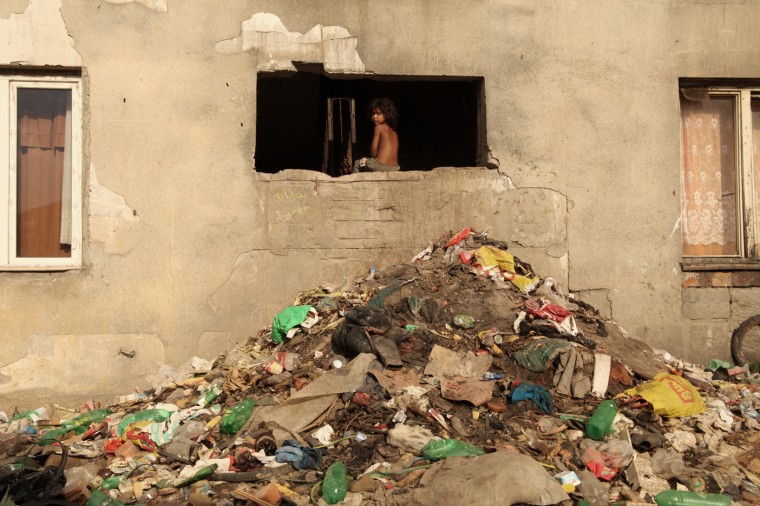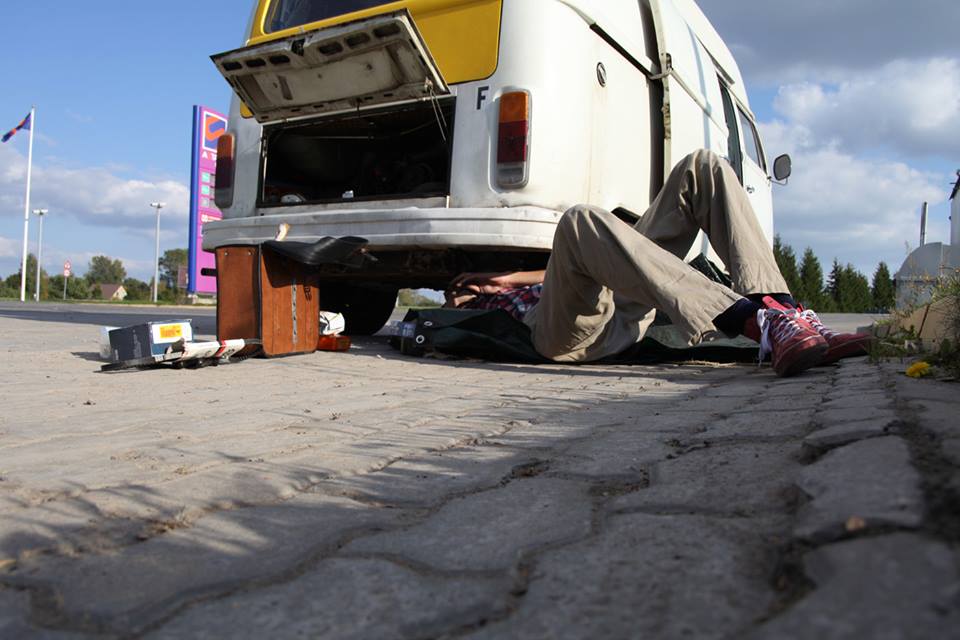Cette semaine, nos baroudeurs arpentent la Serbie et la Bosnie-Herzégovine, deux pays que l’histoire oppose et qui s’interrogent sur leur avenir à la veille des commémorations du 28 juin 1914, jour de l’assassinat de l’archiduc François-Ferdinand, élément déclencheur du premier conflit mondial.
Le Bulli a fait une halte pour une nuit au monastère de Tronosa en Serbie, un monastère orthodoxe du XIVe siècle. – Illustration Jonathan Bonard
Le Bulli emprunte les petites routes de montagnes, traversant les postes frontières et rencontrant bien souvent quelques agents de police, intrigués par ce curieux véhicule.
Sur leur chemin, nos reporters ont rencontré Ivana Vukelic, 26 ans, à Novi Sad, deuxième grande ville de Serbie après Belgrade. Elle explique de quelle manière la Serbie omet les pages sombres de son histoire, dont la guerre de Yougoslavie : « on ne parle pas des raisons de la guerre, on ne parle pas des victimes », constate-t-elle en ajoutant « on ne connaît pas la vraie histoire de la Serbie ». La situation économique difficile du pays, ainsi que ses relations avec ses voisins assombrissent les perspectives d’avenir pour la jeunesse serbe et des pays voisins. Le projet de réconciliation, prôné par certaines associations et mouvements, est mis à mal par un nationalisme bien ancré dans les sociétés des pays belligérants.
Ces tensions, toujours d’actualité, viennent assombrir les préparatifs des commémorations du début de la Première Guerre mondiale. En effet, Sarajevo peaufine les célébrations autour du centenaire de l’assassinat de l’archiduc François Ferdinand. Ces célébrations réuniront les nombreux pays belligérants, qui ont participé au quatre années de guerre meurtrières. Parmi ces pays, les anciennes républiques yougoslaves, qui se sont affrontées dans les années 1990. Aujourd’hui, la réconciliation apparaît encore lointaine et plusieurs personnalités dénoncent l’irresponsabilité des organisateurs, qui ont choisi Sarajevo pour les commémorations de la Première Guerre mondiale. Ce triste anniversaire s’annonce donc amer.
A Srebrenica en Bosnie, ville que l’armée serbe fait tomber en 1995 après deux ans de siège, nous avons recueilli les mots de Fadila Efendic, dont le fils et le mari se comptent parmi les 8 000 hommes et adolescents bosniaques qui furent exécutés. Dans sa petite boutique de souvenirs en face du cimetière, où ils sont enterrés, cette « Mère Courage » bosniaque porte un regard sur l’avenir de son pays : « je veux que la Bosnie redevienne normale, que les politiciens soient meilleurs, et je souhaite du travail aux jeunes », confie-t-elle.
Jeudi 19 juin, à 19h, aux Savons d’Hélène à Strasbourg, retrouvez les équipes du Bulli Tour Europa et de la Croisée des routes pour une projection-débat sur le siège de Sarajevo et sur le Centre André Malraux, créé par Francis Bueb. Venez découvrir le film Sarajevo : notre mémoire, réalisé par Robin Hunzinger.
Chronicle of week n°4 : A cut short reconciliation
This week, our adventurers stride along between Serbia and Bosnia-Herzegovina, two countries who have confronted each other throughout history and who question their future, right before the commemorations of the 28th of June 1914, the day of the assassination of the archduke Franz Ferdinand, the event that started the first global conflict.
The Bulli stopped for a night at the monastery of Tronosa in Serbia, an orthodox monastery of the 14th century.
The Bulli drives along the little mountainous roads, crossing the border posts and very often coming across policemen, intrigued by this curious vehicle.
On the road, our reporters have met Ivana Vukelic, 26 years old, in Novi Sad, the second biggest city of Serbia after Belgrade. She explains how Serbia omits the darkest pages of its history, among them the war of Yugoslavia: « we don’t talk about the reasons for the war, nor about the victims », she notices adding « we don’t know the real history of Serbia ». The difficult economic situation, and the relations with the neighbouring countries darken the future for the youth of Serbia and of the surrounding countries. The project of reconciliation, advocated by some associations and movements, is being jeopardized by nationalism well anchored in the societies of the belligerent countries.
These tensions, still current, darken the preparations of the commemorations of the start of World War I. In fact, Sarajevo puts the finishing touches on the preparations surrounding the celebrations of the centenary of the assassination of the archduke Franz Ferdinand. These celebrations will bring together the numerous belligerent countries, who took part in the four years of the deadly war. Among these countries, the former Yugoslavian republics, who fought against one another in the 1990s. Today, the reconciliation still seems faraway and several personalities criticize the lack of responsibility of the organizers, who have chosen Sarajevo as the city for the commemorations of World War I. This sad anniversary seems bitter.
In Srebrenica in Bosnia, a city that the Serbian army conquered after two years of siege, we have listened to the testimony of Fadila Efendic, whose husband and son are among the 8,000 Bosnian men and teenagers who were executed. In her small gift shop in front of the cemetery, where they are buried, this Bosnian « Mother Courage » gives us her point of view on the future of her country: « I want Bosnia to be normal again, the politicians to become better, and I hope that youngsters can work », she says.
Thursday June 19th, meet the staff of the Bulli Tour Europa and of « la Croisée des routes » for a screening and debate on the siege of Sarajevo and on the Centre André Malraux, founded by Francis Bueb. Come and discover the film Sarajevo : notre mémoire, made by Robin Hunzinger.
Chronik der vierten Woche – eine scheiternde Versöhnung
Diese Woche führte uns unser Abenteuer nach Serbien und Bosnien-Herzegowina, zwei Länder die sich in der Geschichte schon mehrfach gegenüberstanden und die nun wieder einmal ihre Zukunft in Frage stellen, just vor dem Gedenken an den 28. Juni 1914, dem Tag der Ermordung des Erzherzogs Franz Ferdinands, welche als Auslöser für den ersten globalen Konflikt überhaupt gilt.
Für eine Nacht hat der Bulli auch in einem orthodoxen Kloster aus dem 14. Jahrhundert in Tronosa, Serbien, Halt gemacht.
Der Bulli fuhr über all die kleinen Bergstraßen, überquerte die Grenzposten und traf des Öfteren auch auf neugierige Polizisten, die fasziniert waren von diesem ungewöhnlichen Fahrzeug.
On the road, our reporters have met Ivana Vukelic, 26 years old, in Novi Sad, the second biggest city of Serbia after Belgrade. She explains how Serbia omits the darkest pages of its history, among them the war of Yugoslavia: « we don’t talk about the reasons for the war, nor about the victims », she notices adding « we don’t know the real history of Serbia ». The difficult economic situation, and the relations with the neighbouring countries darken the future for the youth of Serbia and of the surrounding countries. The project of reconciliation, advocated by some associations and movements, is being jeopardized by nationalism well anchored in the societies of the belligerent countries.
Auf ihrem Weg haben unsere beiden Reporter auch Ivana Vukelic (26) in Novi Sad, nach Belgrad die zweitgrößte Stadt Serbiens, getroffen. Sie erklärt, wie Serbien, die dunklen Seiten in seinen Geschichtsbüchern, nämlich die über den Jugoslawienkrieg, einfach auslässt: „Wir sprechen weder über die Gründe für den Krieg, noch über die Opfer“ und weiter „wir kennen die wahre Geschichte von Serbien überhaupt nicht“. Die schwierige wirtschaftliche Situation und die Beziehungen zu den Nachbarländern verdunkeln noch umso mehr die Zukunft der Jugend in Serbien, wie auch derer in den angrenzenden Ländern. Der Versuch der Versöhnung, angeleitet durch einige Vereine und Bewegungen, ist gefährdet durch den Nationalismus, der stark verankert ist in den ehemaligen Kriegsnationen.
Eben diese Spannungen sind immer noch aktuell und werfen natürlich auch ihre Schatten auf die Vorbereitungen für das Gedenken an den Beginn des ersten Weltkriegs. In Sarajevo liegen die Vorbereitungen rum um die Feierlichkeiten zur hundertsten Jährung der Ermordung Franz Ferdinands in den letzten Zügen. Diese Veranstaltung wird eben jene ehemaligen Kriegsnationen zusammenbringen, die an den vier blutigen Jahren des Krieges beteiligt waren. Denn es sind eben jene Länder des ehemaligen Jugoslawiens die damals in den 1990ern gegeneinander kämpften. Noch immer scheint die Aussöhnung in weiter Ferne zu liegen und vielfach wird auch Kritik an der Verantwortungslosigkeit der Organisatoren laut, die Sarajevo als Gedenkort für den ersten Weltkrieg ausgewählt haben. Es scheint neben dem eh schon traurigem, geradezu ein bitteres Jubiläum zu werden.
In Srebrenica in Bosnien, einer Stadt die nach zweijähriger Besetzung von der serbischen Armee erobert wurde, haben wir den Erzählungen der Zeugin Fadila Efendic gelauscht, deren Ehemann und Sohn unter den 8000 bosnischen Männern und Jugendlichen waren, die hingerichtet wurden. In ihrem kleinen Souvenir-Shop direkt am Fuße des Friedhofs, auf dem sie alle begraben liegen, erklärt uns diese bosnische „Mutter Courage“ ihre Sicht auf die Zukunft ihres Landes: „Ich will, dass Bosnien wieder normal wird, dass die Politiker besser werden und die Jugend arbeiten kann“ sagt sie.
Am Donnerstag, dem 19. Juni gibt um 19.00 Uhr die Möglichkeit mit dem Team der Bulli Tour und des „la Croisée Rouge“ über die Besetzung Sarjevos und das Centre André Malraux, gegründet von Francis Bueb, zu diskutieren. Kommen Sie vorbei und entdecken Sie den Film Sarajevo : notre mémoire von Robin Hunzinger.

